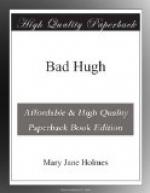“I can cry dreffully now, Miss Alice, I’se sorry, Miss ’Lina is dead, very sorry. She never can come back any more, can she?” Mug sobbed, running up to Alice, and hiding her face in her dress.
And this was about as real as any grief expressed by the blacks for ’Lina. Poor ’Lina, she had taken no pains to win affection while she was living, and she could not expect to be missed much when she was gone. Hugh mourned for her the most, more even than his mother or Densie Densmore—the latter of whom seemed crazier than ever, shutting herself entirely in her room, and refusing to be present at the funeral. ’Lina had been ashamed of her, she said, and she would not disgrace her by claiming relationship now that she was dead, so with eyes whose blackness was dimmed by tears, she watched from her window the procession moving from the yard, across the fields, and out to the hillside, where the Spring Bank dead were buried, and where on the last day of blooming, beautiful May, they laid ’Lina to rest, forgetting all her faults, and speaking only kindly words of her as they went slowly back to the house, from which she had gone forever.
CHAPTER XLI
TIDINGS
A few days after ’Lina’s burial, there came three letters to Spring Bank, one to Mrs. Worthington from Murdock, as he now chose to be called, saying that though he had looked, and was still looking everywhere for the missing Adah, he could only trace her, and that but vaguely, to the Greenbush depot, where he lost sight of her entirely, no one after that having seen a person bearing the least resemblance to her. After a consultation with the doctor, he had advertised for her, and he inclosed a copy of the advertisement, as it appeared in the different papers of Boston, Albany, and New York.
“If A—— H—— will let her whereabouts be known to her friends, she will hear of something to her advantage.”
This was the purport of Murdock’s letter, if we except a kind of inquiry after ’Lina, of whose death he had not heard.
The second, for Alice, was from Anna Richards, who was also ignorant as yet of ’Lina’s decease. After inquiring kindly for the unfortunate girl, she wrote:
“I have great hopes of my erring brother, now that I know how his whole heart goes toward his beautiful boy, our darling Willie. I wish poor, dear Lily could have seen him when, on his arrival at Terrace Hill, he not only bent over, but knelt by the crib of his sleeping child, waking him at once, and hugging him to his bosom, while his tears dropped like rain. I am sure she would have chosen to be his wife, for her own sake as well as Willie’s.
“You know how proud my mother and sisters are, and it would surprise you, as it does me, to see them pet, and spoil, and fondle Willie, who rules the entire household, mother even allowing him to bring wheelbarrow, drum, and trumpet into the parlor, declaring that she likes the noise, as it stirs up her blood. Willie has made a vast change in our once quiet home, and I fear I shall meet with much opposition when I take him away, as I expect to do next month, for Lily gave him to me, and brother John has said that I may have him until the mother is found, while Charlie is perfectly willing; and thus, you see, my cup of joy is full.




